Latest Gear Live Videos
New Zealand Doctor Claims Carbs Are Addictive

Posted by Sheila Franklin Categories: Science,
 Good news for those who insist that their spare tire is due to genetics. That is not quite the case, but a New Zealand scientist claims that carbohydrates may be as addictive as cigarettes, giving us a new excuse. He claims that heavily processed carbs found in as cereal and desserts raise the amount of sugar in blood. The result is that the sugar rush stimulates the same part of the brain that involves nicotine addiction. Dr.Thornley says that more studying is needed but that so far his research shows that those with a high body mass index have fewer brain pleasure receptors like in those who are addicted to cocaine and alcohol.
Good news for those who insist that their spare tire is due to genetics. That is not quite the case, but a New Zealand scientist claims that carbohydrates may be as addictive as cigarettes, giving us a new excuse. He claims that heavily processed carbs found in as cereal and desserts raise the amount of sugar in blood. The result is that the sugar rush stimulates the same part of the brain that involves nicotine addiction. Dr.Thornley says that more studying is needed but that so far his research shows that those with a high body mass index have fewer brain pleasure receptors like in those who are addicted to cocaine and alcohol.
Read More  | Fox News
| Fox News
Advertisement
MIT Develops Software to Replace Post-its

Posted by Sheila Franklin Categories: Science, Software,
 A team of MIT computer scientists decided to develop software to combine all those sticky notes with a result that it will enter, store and retrieve information. Michael Bernstein claims the team is not trying to replace Post-its, just understand the “classes of things people do with Post-its and see if we can help users do more of what they wanted to do in the first place.”
A team of MIT computer scientists decided to develop software to combine all those sticky notes with a result that it will enter, store and retrieve information. Michael Bernstein claims the team is not trying to replace Post-its, just understand the “classes of things people do with Post-its and see if we can help users do more of what they wanted to do in the first place.”
What started out as a 2007 simple study became a larger project. The systems devised include a program to capture broad content and one that streamlines note taking. The team found that if too much effort is required to store the data, most people won’t bother. We admit that we would miss our collage of paper scraps that adorn our desk.
Read More  | MIT
| MIT
Charges Rise on Dell MS XP Downgrade

Posted by Sheila Franklin Categories: Editorial, Microsoft, PC / Laptop,
 Last June, Dell began to charge customers $20.00 to $50.00 to downgrade to Windows XP. It was up to $100.00 by October. Now it seems that they are charging $150.00. At the same time, we recently read that Microsoft claims that 9 out of 10 Vista customers are satisfied. While we don’t believe everything we read, we keep wondering why Dell is punishing XP users and MS’s inhouse research, with figures that include licenses sold as part of a downgrade package, seems cheerfully optimistic. What do you guys think? Remember when Coke came up with a new version and nobody liked it? It just went away.
Last June, Dell began to charge customers $20.00 to $50.00 to downgrade to Windows XP. It was up to $100.00 by October. Now it seems that they are charging $150.00. At the same time, we recently read that Microsoft claims that 9 out of 10 Vista customers are satisfied. While we don’t believe everything we read, we keep wondering why Dell is punishing XP users and MS’s inhouse research, with figures that include licenses sold as part of a downgrade package, seems cheerfully optimistic. What do you guys think? Remember when Coke came up with a new version and nobody liked it? It just went away.
Read More  | Silicon Alley Insider
| Silicon Alley Insider
Oki and Waseda University Develop Remote Voice Recognition

Posted by Sheila Franklin Categories: Design, HDTV, Home Entertainment, Misc. Tech,
 No more fighting for the remote if Oki Japan and a team from Waseda University have their way. They place 4 microphones in the front of a remote, then utilize an algorithm for voice frequency analysis. This separates the main voice from other ambient noise sources. We are assuming that if you are the one who carries the loudest voice, then you will be the one to rule the remote. We will be curious once the device goes pass the prototype stage and becomes channel surfing survival of the fastest, or loudest.
No more fighting for the remote if Oki Japan and a team from Waseda University have their way. They place 4 microphones in the front of a remote, then utilize an algorithm for voice frequency analysis. This separates the main voice from other ambient noise sources. We are assuming that if you are the one who carries the loudest voice, then you will be the one to rule the remote. We will be curious once the device goes pass the prototype stage and becomes channel surfing survival of the fastest, or loudest.
Read More  | Digital World Tokyo
| Digital World Tokyo
SNEAKEY Reproduces Keys by Teleduplication

Posted by Sheila Franklin Categories: Cameras, Mods / Hacks, Science,

A team from UCSD came up with a way to steal keys without detection. Their SNEAKEY system used teleduplication to take an image of these keys from 195 feet away using imaging equipment, then managed to duplicate them with computer vision algorithms. You can read the details of the studies that were conducted in both laboratory and real settings on their site. The moral of the story is that even though these were the good guys, always keep your keys in your pocket when not needed.
Read More  | UCSD
| UCSD
Buckypaper May Replace Heavy Metal

Posted by Sheila Franklin Categories: PC / Laptop, Science, Transportation,
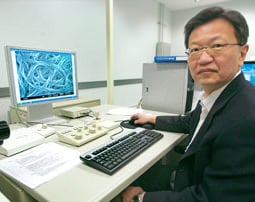 Buckypaper may look like regular carbon paper, but is in actual fact Florida State University’s Ben Wang’s material that is 10 times lighter but up to 500 times stronger than steel when stacked and pressed. It has the capability of conducting electricity and dispensing heat. The material is made from tube-shaped carbon molecules 50,000x thinner than a human’s hair. Applications would include energy-efficient aircraft and cars, and more powerful computers. At this point buckypaper, which came out of the discovery of the buckyball (a form of pure carbon,) is only made at half of its strength and is very expensive to produce, FSU is planning to developing it commercially in the next 12 months, according to Wang.
Buckypaper may look like regular carbon paper, but is in actual fact Florida State University’s Ben Wang’s material that is 10 times lighter but up to 500 times stronger than steel when stacked and pressed. It has the capability of conducting electricity and dispensing heat. The material is made from tube-shaped carbon molecules 50,000x thinner than a human’s hair. Applications would include energy-efficient aircraft and cars, and more powerful computers. At this point buckypaper, which came out of the discovery of the buckyball (a form of pure carbon,) is only made at half of its strength and is very expensive to produce, FSU is planning to developing it commercially in the next 12 months, according to Wang.
Read More  | CNN
| CNN
Paralyzed Monkey Relearns Movement

Posted by Sheila Franklin Categories: PC / Laptop, Science, Video Games,
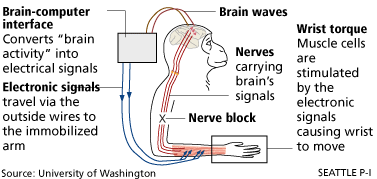
Researchers at the University of Washington have successfully tested a simple approach to help those who are paralyzed. Their method is to use a direct connection between nerve cells and muscles to reteach the brain. The brain-machine interface was used to teach monkeys with wrist paralysis to play a video game. While most scientists were trying to train them to make movements, the team used a biofeedback meter and applesauce (as reward) to change their brain activity.
Read More  | Seattle PI
| Seattle PI
Internet Surfing Encourages Brain Activity

Posted by Sheila Franklin Categories: Internet, Science,
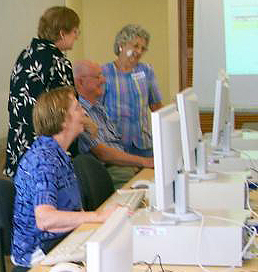 Next time your spouse/partner complains that you are on the Internet too much, you can site this study that will be in an upcoming American Journal of Geriatric Psychiatry. The report suggests that middle-aged and older adults who use the Net may get a brain boosting. Using 24 “normal” volunteers between the ages of 55 and 76, half of the group had previous experience surfing. The participants showed similar brain activity when reading a book and those who went online also registered activity in the frontal, temporal and cingulate areas, which are those that control decision making and complex reasoning.
Next time your spouse/partner complains that you are on the Internet too much, you can site this study that will be in an upcoming American Journal of Geriatric Psychiatry. The report suggests that middle-aged and older adults who use the Net may get a brain boosting. Using 24 “normal” volunteers between the ages of 55 and 76, half of the group had previous experience surfing. The participants showed similar brain activity when reading a book and those who went online also registered activity in the frontal, temporal and cingulate areas, which are those that control decision making and complex reasoning.
Read More  | Live Science
| Live Science
StarCave Virtual Reality Room

Posted by Sheila Franklin Categories: Design, Misc. Tech, Science,
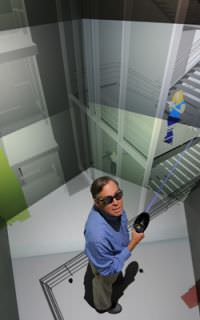 Ever wish you could jump into Second Life? Researchers at the California Institute for Telecommunications and Information Technology (Calit2) almost can with the StarCave, a third generation virtual reality space. The pentagon-shaped room consists of computers, rear-projection walls, and floor screens, and displays over 68 million pixels. The room supports 20/40 vision when the users wear lightweight, polarized sunglasses. At a cost of about a million dollars, the StarCave works by pointing a wand to go through the 3D images and/or zoom.
Ever wish you could jump into Second Life? Researchers at the California Institute for Telecommunications and Information Technology (Calit2) almost can with the StarCave, a third generation virtual reality space. The pentagon-shaped room consists of computers, rear-projection walls, and floor screens, and displays over 68 million pixels. The room supports 20/40 vision when the users wear lightweight, polarized sunglasses. At a cost of about a million dollars, the StarCave works by pointing a wand to go through the 3D images and/or zoom.
Read More  | UC San Diego News
| UC San Diego News
LHC Works Without Earth Being Sucked Up

Posted by Sheila Franklin Categories: Corporate News, Science,
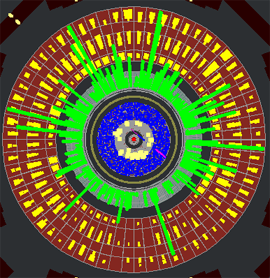 We are still here! In case you hadn’t heard, the LHC initialization is a success. After all the colliding beams are established, the researchers will be measuring and calibrating before performing 4 major experiments. One will help explain how gravity acts on mass and another will seek out the universe’s dark matter. Two others involve nature’s preference for matter over antimatter and matter as it began. Congrats to the team and thanks for allowing us to learn more without ending life as we know it, not to mention the kewl art it produced.
We are still here! In case you hadn’t heard, the LHC initialization is a success. After all the colliding beams are established, the researchers will be measuring and calibrating before performing 4 major experiments. One will help explain how gravity acts on mass and another will seek out the universe’s dark matter. Two others involve nature’s preference for matter over antimatter and matter as it began. Congrats to the team and thanks for allowing us to learn more without ending life as we know it, not to mention the kewl art it produced.
Read More  | CERN
| CERN
Advertisement
© Gear Live Inc. {year} – User-posted content, unless source is quoted, is licensed under a Creative Commons Public Domain License. Gear Live graphics, logos, designs, page headers, button icons, videos, articles, blogs, forums, scripts and other service names are the trademarks of Gear Live Inc.










